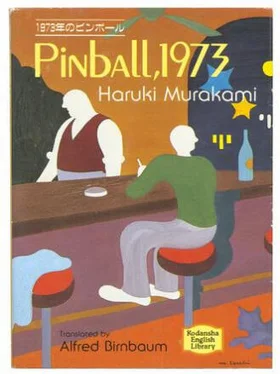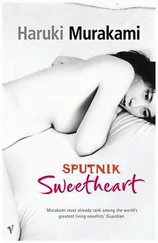Haruki Murakami - Pinball, 1973
Здесь есть возможность читать онлайн «Haruki Murakami - Pinball, 1973» весь текст электронной книги совершенно бесплатно (целиком полную версию без сокращений). В некоторых случаях можно слушать аудио, скачать через торрент в формате fb2 и присутствует краткое содержание. Издательство: Unknown publisher, Жанр: Современная проза, на английском языке. Описание произведения, (предисловие) а так же отзывы посетителей доступны на портале библиотеки ЛибКат.
- Название:Pinball, 1973
- Автор:
- Издательство:Unknown publisher
- Жанр:
- Год:неизвестен
- ISBN:нет данных
- Рейтинг книги:3 / 5. Голосов: 1
-
Избранное:Добавить в избранное
- Отзывы:
-
Ваша оценка:
- 60
- 1
- 2
- 3
- 4
- 5
Pinball, 1973: краткое содержание, описание и аннотация
Предлагаем к чтению аннотацию, описание, краткое содержание или предисловие (зависит от того, что написал сам автор книги «Pinball, 1973»). Если вы не нашли необходимую информацию о книге — напишите в комментариях, мы постараемся отыскать её.
Pinball, 1973 — читать онлайн бесплатно полную книгу (весь текст) целиком
Ниже представлен текст книги, разбитый по страницам. Система сохранения места последней прочитанной страницы, позволяет с удобством читать онлайн бесплатно книгу «Pinball, 1973», без необходимости каждый раз заново искать на чём Вы остановились. Поставьте закладку, и сможете в любой момент перейти на страницу, на которой закончили чтение.
Интервал:
Закладка:
"Guh."
And the twin wearing the 208 sweatshirt brought a beer and a glass.
"Some music?"
"Would be nice."
She pulled Handel's Recorder Sonatas out of the record rack, put it on the player, and lowered the needle. A Valentine's Day present from a girlfriend a good many years before. The sound of sauteing meat came through the recorder, violin, and cello like a continuous undertone. My girlfriend and I had often had sex to this record. Even after the record ended, what did we care that the needle was scratching on and on, revolution after revolution? We would still be going at it.
Outside the window, rain was falling noiselessly over the dark golf course. I finished my beer, and by the time Hans-Martin Linde played the last note of the Sonata in F Major, dinner was ready. The three of us were unusually quiet over the meal that night. By then the record had ended, so other than the patter of rain on the eaves, and the sound of three sets of jaws chewing meat, the room was silent. When we were through, the twins cleared the table, and the two of them stood around in the kitchen brewing coffee. Then the three of us drank our hot coffee. Brimming with the aroma of life, that coffee was. One of them got up to put on a record. It was the Beatles' "Rubber Soul."
"Hey, I don't remember buying that record," I blurted out in surprise.
"We bought it."
"Little by little we saved up the money you gave us.
I just shook my head.
"You don't like the Beatles?"
Silence.
"What a shame. And we thought you'd be pleased."
"Sorry."
One of them got up, took the record off, and lovingly brushed off the least speck of dust before slipping it back into its jacket. All the while, none of us spoke a word. Then I let out a sigh.
"I didn't mean it that way," I explained. "I'm just a little tired and irritable. Let's give it another listen."
The two of them looked at each other and broke into a chuckle.
"Don't put yourself out now. It's your house after all."
"No, really, you don't have to put up with it on our account."
"Let's give it another listen."
So we ended up listening to both sides of "Rubber Soul" over coffee. And I managed to loosen up a bit. The twins seemed in particularly good spirits.
After we finished our coffee, the twins took my temperature. Back and forth, the two of them grimaced at the thermometer. One hundred one degrees. Up a degree since morning. I felt light-headed.
"Taking showers like that, worst thing for you."
"You ought to get some sleep."
They were perfectly right, of course. I got undressed and climbed into bed with the Critique of Pure Reason and a pack of cigarettes. The blanket somehow smelled of the sunny outdoors. Kant was as brilliant as ever, but the cigarettes tasted like damp newspaper lit from a gas burner. I closed the book, and was half-listening to the twins' voices, with eyes closed, when the darkness dragged me under.
8
The cemetery occupied a good spread near the top of the hill. Narrow gravel walkways crisscrossed between the graves, and close-cropped azalea bushes stood about here and there like grazing sheep. A row or two of mercury-vapor lamps, peering down over the expanse, arched up like overgrown fiddleheads, casting an unnatural white light into every corner of the grounds.
The Rat stopped the car in the woods at the southeast corner of the cemetery and surveyed the night streets below, his arm around her shoulder. All those lights. The whole town looked to have been cast in a single sheet, still glowing warm in the mold. Either that, or a giant moth had just sprinkled its golden dust all over the place.
Dreamily she closed her eyes and pressed against the Rat. From his shoulder on down, the Rat felt the supple weight of her body. An odd sensation, that weight. This being that could love a man, bear children, grow old, and die; to think one whole existence was in this weight. The Rat took a cigarette from his pack and lit up. Every once in a while a sea breeze would sweep up the slope from below and rustle the pine trees. Maybe she had really fallen asleep. The Rat put his hand to her cheek, then touched a fingertip to her lips. He felt her breath, warm and humid.
Somehow the cemetery seemed more like an unfinished housing tract than a graveyard. Over half the plots were empty. That's because the people slated for those places were still living. Occasionally, on Sunday afternoons, some people would drive up with their families to check out their future resting places. Gazing out over the grounds from the stone base already erected on the spot, Hmmm, nice view from here, flowers of the season, good fresh air, lawn looks well cared for, even got sprinklers. And no wild dogs to get at the offerings.
But above all, they'd be impressed by the bright, healthy atmosphere. Satisfied, they'd sit down on a bench to eat their box lunches, and then return home to the day-to-day bustle of their lives.
Mornings and evenings the caretaker would rake the gravel walkways. Then he'd chase away any kids who might have their eyes on the carp in the central pond. And as if that wasn't enough, three times a day – at nine, twelve, and six – a music-box rendition of "Old Black Joe" would be piped from speakers around the grounds. The Rat could never figure out what possible meaning there could be in playing music, although he had to admit that "Old Black Joe" playing to a deserted graveyard at six o'clock in the waning light was definitely something to experience.
At six-thirty, the caretaker would return by bus to the realm below, and total silence would fall over the necropolis. Then the couples would begin arriving to make out in their cars. Come summer, the cars would be literally lined up through the woods.
The cemetery thus held a place of profound significance in the Rat's adolescent years. Even in high school before he could drive, the Rat was ferrying girls up the incline by the stream on the back of a 250-cc bike. Always staring up at the same street lamps, he'd had himself a whole string of girls. Like so many scents briefly enjoyed before they wafted away. So many dreams, so many disappointments, so many promises. And in the end, they all just vanished.
Turn around, and death had put down roots beneath each plot across the extensive grounds. Occasionally, the Rat would take these girls by the hand and wander about on the gravel paths of this pretentious cemetery. All those different names, dates, deaths, each backed with a past life, were like shrubs in an arboretum, spaced out equidistantly as far as the eye could see. No gently swaying breezes for them, no fragrances, no touch of a hand reaching through the darkness. They who seemed like trees lost to time. They to whom no thoughts occurred, nor would ever have words to get them across. They'd left all that to those who still had some living to do. He and his girl would head back to the woods, holding each other tight. And all around there'd be the sea breeze, the leafy scent of the trees, the sounds of crickets, everything of this world that went on living.
"Was I asleep long?" she asked.
"Nah," said the Rat. "No time at all."
9
It was another rerun of the same old day. One you almost had to dog-ear to keep from getting it mixed up with the rest.
All day long it smelled like autumn. I finished work at the usual time, but when I got home there was no sign of the twins. I tumbled onto the bed still wearing my socks, and lounged about smoking a cigarette. I tried thinking of different things, but nothing came to mind. I sighed, sat up in bed, and stared a while at the white blank of the opposite wall. I didn't have the vaguest idea of what to do – I couldn't keep staring at the wall forever, I told myself. But even that admonition didn't work. A faculty advisor reviewing a graduation thesis would have had the perfect comment: you write well, you argue clearly, but you don't have anything to say.
Читать дальшеИнтервал:
Закладка:
Похожие книги на «Pinball, 1973»
Представляем Вашему вниманию похожие книги на «Pinball, 1973» списком для выбора. Мы отобрали схожую по названию и смыслу литературу в надежде предоставить читателям больше вариантов отыскать новые, интересные, ещё непрочитанные произведения.
Обсуждение, отзывы о книге «Pinball, 1973» и просто собственные мнения читателей. Оставьте ваши комментарии, напишите, что Вы думаете о произведении, его смысле или главных героях. Укажите что конкретно понравилось, а что нет, и почему Вы так считаете.












